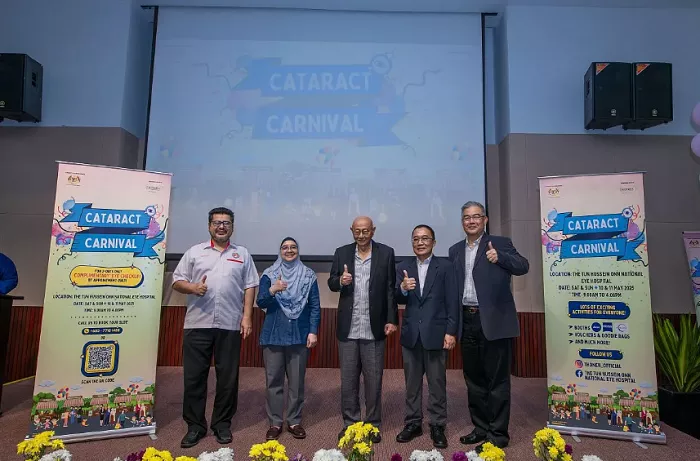In a strong show of cooperation between the public and private sectors, the Tun Hussein Onn National Eye Hospital has partnered with the Ministry of Health (MOH) to launch Malaysia’s first Cataract Carnival. The two-day event provided free cataract surgeries to 60 Malaysians from the B40 income group.
The goal of the Carnival was to reduce preventable blindness, especially among older adults, while promoting the importance of early detection and fair access to quality eye care.
Cataracts are the leading cause of vision loss in Malaysia, especially among the elderly. According to the National Eye Survey III, about 160,000 Malaysians over age 50 suffer from low vision, and 8% are completely blind. Cataracts account for 58.6% of these cases.
The event saw active support from Hospital Ampang, Hospital Serdang, and Hospital Tengku Ampuan Rahimah, Klang. Medical teams from these hospitals worked closely with the Tun Hussein Onn National Eye Hospital to refer patients and perform surgeries.
The Carnival was officially launched by Dr Nor Fariza Ngah, Deputy Health Director-General (Research and Technical Support); Dr Faizal Mat Arifin, Deputy Selangor State Health Director (Medical); Tengku Azlan Sultan Abu Bakar, Chairman of the Eye Hospital; and Michael Goh, the hospital’s Chief Executive Officer.
In her speech, Dr Nor Fariza stressed the importance of early action in treating vision problems and praised the value of collaboration.
“Good vision is not just about health—it opens doors to opportunity and independence,” she said. “This Carnival shows what we can achieve when compassion, skill, and teamwork come together.”
She also noted that over 66,000 cataract surgeries were performed in Malaysia in 2024, with most patients around 65 years old, highlighting the growing need for such services.
Cataracts cause the eye’s natural lens to become cloudy, leading to blurry vision and, if untreated, blindness. This can deeply affect daily life and place emotional and financial pressure on families and the healthcare system. This is why outreach programmes like the Cataract Carnival are so important.
Tengku Azlan, chairman of the hospital, spoke about the broader meaning of restoring sight. “It’s not just about the surgery. It’s about giving people back their independence, their hope, and their quality of life,” he said.
Michael Goh also reaffirmed the hospital’s mission. “For nearly 40 years, we’ve been focused on eye health. This Carnival brings our vision of surgical excellence and community care together. Everyone deserves quality eye care—regardless of income.”
Among the 60 patients was 80-year-old Yap Ching, who had suffered from poor vision in his left eye for years but delayed treatment due to cost. His daughter brought him to the Carnival, which he called a life-changing moment. “I didn’t want to trouble my children,” he said. “But now I’m ready to fix one eye first. If it goes well, then the other.”
His daughter said the Carnival gave their family new hope.
In addition to surgeries, the event offered free eye checkups and educational booths to teach the public about early eye disease detection and proper eye care.
Moving forward, the Tun Hussein Onn National Eye Hospital plans to expand its outreach with the MOH to reduce preventable blindness and ensure that all Malaysians—no matter where they live or how much they earn—can access high-quality eye care.
Related topics:


